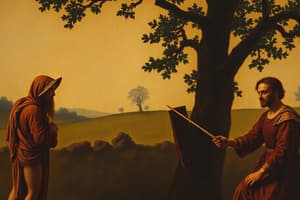Podcast
Questions and Answers
What did Thomas Aquinas' ideas combine to form a new kind of critical thinking?
What did Thomas Aquinas' ideas combine to form a new kind of critical thinking?
- Aristotelian learning and natural science (correct)
- Ethics and politics
- Christianity and scholastic philosophy
- Reality and causality
Which figure from the Renaissance period challenged traditional views of morality and practical wisdom?
Which figure from the Renaissance period challenged traditional views of morality and practical wisdom?
- Plato
- Saint Augustine
- Thomas Aquinas
- Niccolò Machiavelli (correct)
What concept did Machiavelli advocate for in his work The Prince?
What concept did Machiavelli advocate for in his work The Prince?
- Compassion and empathy
- Humility and modesty
- Cunning and deception (correct)
- Honesty and integrity
Which trade route played a crucial role in spreading knowledge during the Renaissance?
Which trade route played a crucial role in spreading knowledge during the Renaissance?
What pivotal roles did Thomas Aquinas play in shaping the Renaissance?
What pivotal roles did Thomas Aquinas play in shaping the Renaissance?
Which philosophical concept did Thomas Aquinas' Summa Theologica become a widely studied textbook for?
Which philosophical concept did Thomas Aquinas' Summa Theologica become a widely studied textbook for?
What is the main focus of scholasticism during the Renaissance?
What is the main focus of scholasticism during the Renaissance?
Who is primarily associated with the teachings of scholasticism during the Renaissance?
Who is primarily associated with the teachings of scholasticism during the Renaissance?
What was the main focus of humanism during the Renaissance?
What was the main focus of humanism during the Renaissance?
Which philosophical system emphasized the importance of secular studies for personal fulfillment?
Which philosophical system emphasized the importance of secular studies for personal fulfillment?
In which aspect did humanists differ significantly from scholastics during the Renaissance?
In which aspect did humanists differ significantly from scholastics during the Renaissance?
What did St. Thomas Aquinas aim to clarify through his integration of Aristotelian philosophy and theology during the Renaissance?
What did St. Thomas Aquinas aim to clarify through his integration of Aristotelian philosophy and theology during the Renaissance?
Flashcards are hidden until you start studying
Study Notes
Renaissance
The Renaissance was a period of cultural, artistic, political, and intellectual 'rebirth' following the Middle Ages in Europe. It spanned from the 14th century through the 17th century. This era is characterized by the revival of classical learning based on new translations of ancient Greek and Roman texts. It marked the beginning of modernity, with profound effects on European culture and society. Herein, we delve into various aspects of this significant epoch.
Scholasticism vs Humanism
During the Renaissance, two contrasting philosophical systems emerged: scholasticism and humanism. Scholasticism is a philosophy that arose out of medieval universities and aimed to reconcile Christian faith with Aristotelian logic. Humanism, on the other hand, emphasizes the importance of secular studies as a means to cultivate virtues and achieve personal fulfillment.
Scholasticism
Scolasticism largely revolves around the teachings of St. Thomas Aquinas, who integrated elements of Aristotelian philosophy and theology. He attempted to clarify divine revelation, which he believed could be understood without violating the principles of reason. Scholastics focused on studying and interpreting authoritative texts, such as religious scriptures, legal codes, and scientific treatises.
Humanism
In contrast to scholasticism, humanists sought to apply rational methods to everyday life. They admired the ancients and saw their achievements as models worthy of imitation. Consequently, they concentrated on achieving excellence in secular literature, history, art, politics, law, grammar, rhetoric, and moral philosophy.
Influential Figures
Several figures played pivotal roles in shaping the Renaissance. Two notable ones are Thomas Aquinas and Niccolò Machiavelli.
Saint Thomas Aquinas
Thomas Aquinas, born in Naples around 1225, was a renowned philosopher, Catholic priest, and Dominican friar. His ideas laid the groundwork for scholastic philosophy. One of his most seminal works, the Summa Theologica, became a widely studied textbook throughout Europe. The Summa offers an encyclopedic synthesis of Aristotelian learning, resulting in a new type of university curriculum centered on the study of the arts and sciences.
Thomas Aquinas combined elements of Aristotle's concepts of reality, causality, natural science, ethics, and politics with Christianity. His ideas were influential because they fostered a new kind of critical thinking that proved compatible with religion.
Niccolò Machiavelli
Niccolò Machiavelli, born in Florence in 1469, was a statesman, philosopher, and writer. Known primarily for his work The Prince, Machiavelli advocated for cunning, deception, manipulation, and realpolitik - the idea that the ends justify the means. His analysis of power and politics has been both lauded and criticized, and it exerted a major influence on later generations of politicians and scholars.
Machiavelli's approach challenged traditional views of morality and practical wisdom. He maintained that the leader must be prepared to break all moral rules if necessary to preserve the state. While some interpretations of his work can appear ruthless, others view him as a progressive thinker whose realism laid the groundwork for modern liberal democracy.
Economic Factors
Trade routes played a crucial role in spreading knowledge during the Renaissance. One such route is the Silk Routes, which connected Asia with Europe via Central Asia and the Middle East. These trade networks facilitated the exchange of goods and ideas between cultures, influencing the development of the Renaissance.
For instance, the Flemish capitalist textile industry flourished due to its monopoly on the Anglo-Persian wool trade brought about by the end of the wool monopoly of Florence. This economic growth fueled the flourishing of art, literature, music, and philosophy that characterizes the Renaissance period.
In conclusion, the Renaissance was characterized by numerous intellectual advances and transformations across various fields. The contrasting philosophical systems of scholasticism and humanism, the influential figures like Thomas Aquinas and Niccolò Machiavelli, and the impact of trade routes on knowledge dissemination all contributed to this epoch's lasting legacy.
Studying That Suits You
Use AI to generate personalized quizzes and flashcards to suit your learning preferences.




